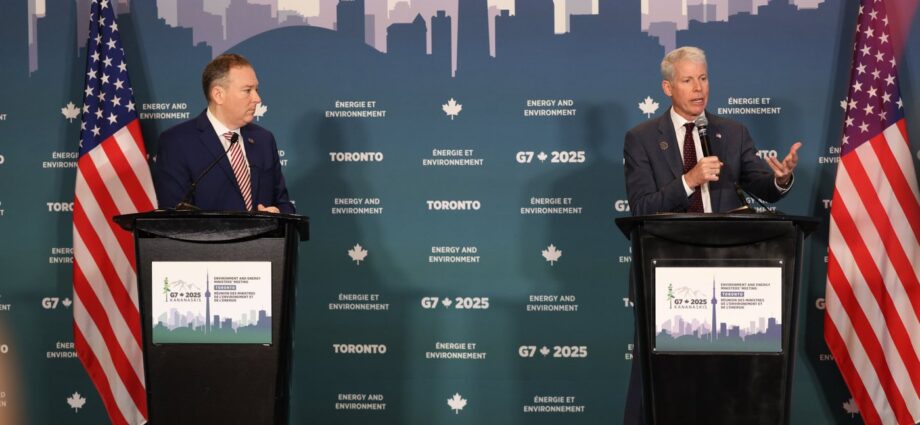
By Abdul Matin Sarfraz, Local Journalism Initiative, Canada’s National Observer
November 1, 2025
Senior members of the Trump administration praised Canada for wildfire coordination on Friday at the G7 meeting in Toronto, while downplaying climate science and pushing forest management as the main solution to cross-border smoke.
At a press conference in Toronto, administrator of the US Environmental Protection Agency Lee Zeldin said recent wildfire smoke events showed the importance of strong coordination between Canada and the United States. He thanked Canada’s environment ministry for “very open” communication during this year’s wildfires, which sent smoke into northern states.
But while acknowledging wildfires “have become a cross border issue,” Zeldin echoed a familiar talking point from Trump allies: blaming Canada’s forest practices instead of climate-driven extreme heat and drought.
Trump’s administration has announced a new, more aggressive approach to managing wildfires that focuses on forest thinning and federal land management, while downplaying climate change as the main driver.
“What Canada experienced, just like what California experienced last January, highlights the need to lean into forest management,” he said. “Canada might have a different approach to how to fight that particular wildfire that impacted them, and California might have a different approach than the Trump administration might prefer.”
Earlier this year, a group of Republican House members sent a letter to Canada’s ambassador demanding that Canada “reduce wildfires” because smoke was affecting summer plans in their districts. They complained the smoke stopped Americans from “spend[ing] time outdoors recreating, enjoying time with family and creating new memories.”
The lawmakers pushed claims that arson and weak forest management were to blame, using talking points from Trump allies.
While acknowledging wildfires “have become a cross border issue,” EPA administrator Lee Zeldin echoed a familiar talking point from Trump allies: blaming Canada’s forest practices instead of climate-driven extreme heat and drought.
Those complaints also did not mention that hundreds of thousands of Canadians have been forced from their homes by wildfires in recent years, nor the aircraft and crews Canada has sent to help fight fires in Alaska and Washington state when smoke moved north.
Research and Canadian fire agencies say most major fires are triggered by lightning, and climate change is making hot, dry fire-weather far more common. Scientists warn focusing on arson and fuel cleanup alone ignores the core driver: rising heat caused by burning fossil fuels.
Zeldin said there were “no roadblocks” in talks with Canadian officials and discussions covered wildfires, mining, Great Lakes protection and emergency communication.
He said the US Environmental Protection Agency wants “maximum open dialogue” with Canada and added he is “very optimistic” about future cooperation, even as the two countries take different paths on climate and forestry.
But cooperation was less evident when the conversation shifted to energy and fossil fuels and trade talks between the two countries.
Wright pushes ‘energy dominance,’ attacks climate policy
US Energy Secretary Chris Wright, a former fracking executive, tied his country’s energy policy to global security, saying the administration is focused on “prosperity at home and peace abroad.”
Wright said Canada and the United States should expand fossil fuel production and supply allies while lowering prices domestically. He also criticized climate policy. “We need to stop, you know, praying to the climate change god that justifies destroying our energy systems, driving up energy prices and scaring children,” he said.
He argued the US has moved beyond energy independence and is now pursuing “energy dominance” to secure markets and influence abroad.
“Our discussions have focused on being honest and math-based in our views on energy and climate change,” he said. “If we get those two things right, we can bring prosperity at home and peace abroad to countries around the world.”

Wright also said G7 countries need to build secure supply chains for critical minerals, warning that China used “non market tactics” to gain dominance in the sector.
“We need to mine, process and refine these materials in North America and across partner countries,” he said. Asked about Canada’s interest in reviving the Keystone XL pipeline, Wright said there are “ongoing conversations” and both sides want cooperation on oil, gas and minerals.
Subscribe to our newsletter.
With files from Marc Fawcett-Atkinson Abdul Matin Sarfraz / Canada’s National Observer / Local Journalism Initiative


